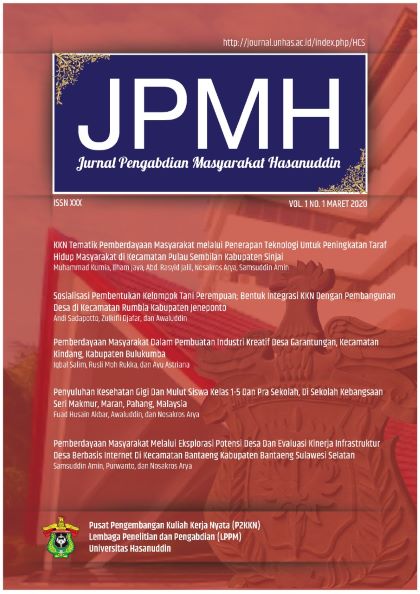Main Article Content
Abstract
This Community Service Program is motivated by the situation of rice field management problems in South Sulawesi and Bulukumba Regency in particular. Lowland rice productivity in South Sulawesi only ranged from 4,197 ~ 5,074 tons/ha or an average of 4,623 tons/ha (BPS, 1993 ~ 2011). The problem lies in: (1) the narrowness of the managed land due to the existence of land pragmentation in farming families and land conversion; (2) land fatigue due to continuous and even excessive use of chemical fertilizers, (3) low adoption of superior seeds due to misunderstandings from farmers regarding the seeds they plant and partly due to frequent failures of the seeds distributed; (4) increasing pest and disease attacks due to the use of various and excessive pesticides, (5) weak regeneration of farmers due to the lack of interest in agricultural graduates to return to farming. This service program recommends a comprehensive solution by combining technological engineering (adoption of liquid organic fertilizer which has been patented by the Research and Development Center for Biotenology LPPM UNHAS under the name MOPlus Biological Fertilizer, adoption of superior hybrid seeds, efficient and effective control of water in farmland, and organic pest control). with social-institutional engineering (in terms of character building of farmers through direct assistance of the Expert Team in the management of lowland rice farming in a modern and sustainable manner). The results of this service program are an increase in productivity (35 ~ 50% of the previous production) and the growth of the nation's character (awareness of the interests of the national economy, scientific work or smart work, and concern for changing ways of thinking from moral choice to rational choice) in supporting increased productivity, competitiveness, and sustainability.
Keywords
Article Details
References
- Abar, Akhmad Zaini. 2016. Petani dalam Perspektif Antropologi Ekonomi. UGM. Yogyakarta.
- Antov, Hans. 1995. Exemplary Centre, Administrative Periphery (Rural Leadership and The New Order in Java). Curzon Press.
- Collier, William L. 1997. “Agricultural Evolution in Java, The Decline of Shared Poverty and Involution”. Stenselon. Bogor.
- Collier, William L. dkk. 1996. Pendekatan Baru dalam Pembangunan Pedesaan di Jawa. Yayasan Obor Indonesia. Jakarta.
- Geertz, Clifford. 1983. Involusi Pertanian, Proses Perubahan Ekonomi di Indonesia. Bhratara. Jakarta.
- Hefner, Robert W. 1999. Geger Tengger, Perubahan Sosial dan Perkelahian Politik. LKiS. Yogyakarta.
- Miles, M.B., dan A.M. Huberman. 1992. Analisis Data Kualitatif. Jakarta : Indonesia University Press.
- Moleong, Lexy J. 1991. Metodologi Penelitian Kualitatif. Edisi Revisi. Bandung : Remaja Rosdakarya.
- Mosher, A.T. 1966. Menggerakkan dan Membangun Pertanian. Syarat – syarat Mutlak Pembangunan dan Modernisasi. Yayasan Dana Buku Indonesia (Frankin Book Program, Inc.).Jakarta.
- Popkin, Samuel L. 1986. Petani Rasional. Terjemahan Sjahril Mawi. Yayasan Padamu Negeri. Jakarta.
- Popkin, Samuel L. 1989. “Memahami Petani Secara Rasional”. Dialog Prisma No. 9. Jakarta.
- Ritzer, George & Douglas J. Goodman, 2004. Teori Sosiologi Modern. Kencana. Jakarta
- Scott, James C. 1983. Moral Ekonomi Petani, Pergolakan dan Subsistensi di Asia Tenggara. LP3ES. Jakarta.
- Scott, James C. 2000. Senjatanya Orang-orang yang Kalah. Yayasan Obor Indonesia. Jakarta.
- Sugiyono, 2007. Memahami Penelitian Kualitatif. Alfabeta. Bandung.
- Tsing, Anna Lowenaupt. 1985. Di Bawah Bayang Bayang Ratu Intan. Yayasan Obor Indonesia. Jakarta.
- Weber, Max. 1958. The Protestant Ethic and the Spirit of Capitalism. New York : Charles Scribner’s Sons.
- ----------------- 2006. Studi Komprehensif Sosiologi Kebudayaan. IRCiSod. Yogyakarta.
- Wolf, Eric R. 1969. Peasant War of The Twentieth Century. Harper and Row. New York.
- Wolf, Eric R. 1983. Petani : Suatu Tinjauan Antropologis. Rajaali dan Yayasan Ilmu Ilmu Sosial. Jakarta.
References
Abar, Akhmad Zaini. 2016. Petani dalam Perspektif Antropologi Ekonomi. UGM. Yogyakarta.
Antov, Hans. 1995. Exemplary Centre, Administrative Periphery (Rural Leadership and The New Order in Java). Curzon Press.
Collier, William L. 1997. “Agricultural Evolution in Java, The Decline of Shared Poverty and Involution”. Stenselon. Bogor.
Collier, William L. dkk. 1996. Pendekatan Baru dalam Pembangunan Pedesaan di Jawa. Yayasan Obor Indonesia. Jakarta.
Geertz, Clifford. 1983. Involusi Pertanian, Proses Perubahan Ekonomi di Indonesia. Bhratara. Jakarta.
Hefner, Robert W. 1999. Geger Tengger, Perubahan Sosial dan Perkelahian Politik. LKiS. Yogyakarta.
Miles, M.B., dan A.M. Huberman. 1992. Analisis Data Kualitatif. Jakarta : Indonesia University Press.
Moleong, Lexy J. 1991. Metodologi Penelitian Kualitatif. Edisi Revisi. Bandung : Remaja Rosdakarya.
Mosher, A.T. 1966. Menggerakkan dan Membangun Pertanian. Syarat – syarat Mutlak Pembangunan dan Modernisasi. Yayasan Dana Buku Indonesia (Frankin Book Program, Inc.).Jakarta.
Popkin, Samuel L. 1986. Petani Rasional. Terjemahan Sjahril Mawi. Yayasan Padamu Negeri. Jakarta.
Popkin, Samuel L. 1989. “Memahami Petani Secara Rasional”. Dialog Prisma No. 9. Jakarta.
Ritzer, George & Douglas J. Goodman, 2004. Teori Sosiologi Modern. Kencana. Jakarta
Scott, James C. 1983. Moral Ekonomi Petani, Pergolakan dan Subsistensi di Asia Tenggara. LP3ES. Jakarta.
Scott, James C. 2000. Senjatanya Orang-orang yang Kalah. Yayasan Obor Indonesia. Jakarta.
Sugiyono, 2007. Memahami Penelitian Kualitatif. Alfabeta. Bandung.
Tsing, Anna Lowenaupt. 1985. Di Bawah Bayang Bayang Ratu Intan. Yayasan Obor Indonesia. Jakarta.
Weber, Max. 1958. The Protestant Ethic and the Spirit of Capitalism. New York : Charles Scribner’s Sons.
----------------- 2006. Studi Komprehensif Sosiologi Kebudayaan. IRCiSod. Yogyakarta.
Wolf, Eric R. 1969. Peasant War of The Twentieth Century. Harper and Row. New York.
Wolf, Eric R. 1983. Petani : Suatu Tinjauan Antropologis. Rajaali dan Yayasan Ilmu Ilmu Sosial. Jakarta.

